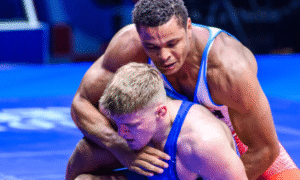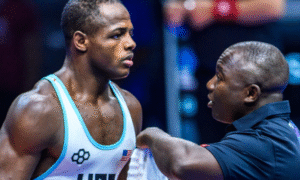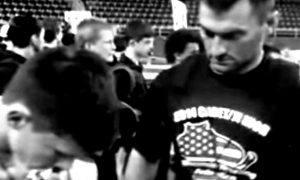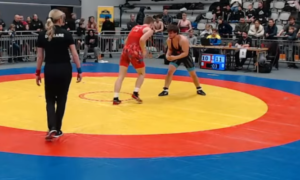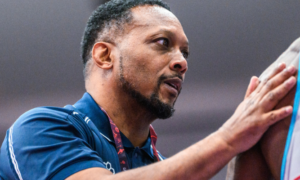Just shy of a week ago, Cohlton Schultz (96 kg, NYAC, Colorado) became the second Greco-Roman wrestler from the United States to win a World title this year and while that is certainly impressive on its own, it is how Schultz went about doing so people are going to remember for a long time.
His first two victories at the Cadet World Championships in Athens, Greece came via pin. His first, against Edson Acuna Salazar (MEX), wasn’t so much of a shocker. Despite the bout unfolding tightly, it seemed like an eventuality the 16-year-old would wind up piling up some points. Instead, he got on top of Acuna Salazar’s head and cement-mixed him down to the mat for the fall. Predictably, Kantemir Shibzukhov (RUS) provided Schultz with a stiff test. Shibzukhov took a 3-1 lead with :24 remaining before Schultz hip-heisted him over with a bodylock. The fall came shortly thereafter.
Then there was the grind-it-out 1-0 defeat of Seyedmojta Hosseini (IRI) in the semis. Every championship run seems to require one of those. But even with that, Schultz bullying Hosseini while avoiding getting smacked for passivity was the way it should be. He was clearly being active. He was trying to command each position. It doesn’t mean we should all come to expect US guys skating by in situations like that, but the fact Schultz showed how to control the action without plodding it up like so many other big guys is a testament to his maturity.
Kamal Bey (75 kg, Sunkist, world no. 18) gave US fans, and wrestling fans in general, a heart-pounding, unforgettable final last month when he clinched his gold at the Junior Worlds. Schultz’s final against Balint Vatzi (HUN) is right up there, though, particularly because of how it ended. Holding a 1-0 lead in the second period, Schultz looked like he was going to somehow be able to rough this one up all the way to the finish line. Vatzi deserves credit here. He had his back to the edge and turned the tables to force Schultz out (who was trying to throw), which gave him a 1-1 criteria advantage as the bout was winding down.
Twenty seconds. It’s not a lot of time, but more than enough to change everything in an instant. Schultz got back to his pummel, locked around Vatzi in a classic clinch, and proceeded to muscle the position forward. For a moment, it appeared as though Schultz wanted to see if he could use the lock to nab a step-out. Maybe he thought better of it. Maybe he realized that there was more offense available than he originally surmised. Schultz wasn’t sure how it all went down. “I can’t even remember in my head, it’s like a blur,” he told Trackwrestling afterwards. “I don’t even remember what I did, but I ended up spinning behind, getting the two points.”
Well, what he did was go one way with the clinch and then the other, twisting Vatzi down. And then he spun behind. When the two wrestlers restarted, there wasn’t a ton of time for Vatzi to work with and not too long after, Schultz was standing on top of the podium with the nation’s anthem playing triumphantly in the background.
Ignore Schultz’s options for now — he has many of them. That was the case before the summer started and obviously, his adventure in Athens likely means more and different opportunities opening up for him. What he is, today, is a World Greco-Roman Champion and the second one of the year for a country badly in need of good press when it comes to this sport. Schultz is an extremely tough, capable, smart wrestler. That’s all true. But he is also living, breathing evidence that our way can work, that the US is in fact beginning to re-assert itself on the global Greco stage. So as you celebrate his victory, feel free to celebrate that, as well.
But he wasn’t alone, not really
Schultz wound up being the only medalist for the Team USA Cadets, but he was certainly not the only one who put on a show. Illinois age-group powerhouse Dylan Ragusin (46 kg) made an impact immediately as he delivered a dazzling offensive display in his round-of-16 win over Mohammadho Abolhassanidaro (IRI). Ragusin was leading 4-2 in the second and then he turned the heat on even more, shucking Abolhassainidaro by for two before closing it out with :20 left on a beautiful inverted arm throw. He fell in his next bout to 2016 Cadet European Championships runner-up Anvar Allakhiarov (RUS) via fall, but up until that point it was a barnburner.
It was like this for several others. You weren’t disappointed merely because they lost and missed out on earning medals. You just wanted to see them get more matches in. For entertainment purposes. The US Cadets were exciting. Lucas Byrd (50 kg, OH) and Ridge Lovett (54 kg, ID) chief among them.
Byrd’s two victories came against Yordan Nedzhat (BUL) and Din Koshkar (KAZ) and in both cases, the gifted Ohioan let loose with aggression. Byrd was going to tech Nedzhat, that much was an inevitability, but he came away with a pin. Koshkar pressed the action on occasion and came up with a couple of scores, but Byrd stayed composed and ready en-route to a 10-6 win. He would end up falling to 2016 Cadet World bronze medalist Vladimir Zabeyvorota (RUS), who earned his second consecutive medal of the same color the next day, so no reason there for him to hang his head. Byrd wrestled brilliantly.
If there is anything to take away from Lovett’s performance in Athens, it is that his style, his way of attacking, and the innate fight that apparently resides inside of him, are all made for high-level competition. In his first-ever World tournament, Lovett was a revelation. Being good against other US kids is nice, but it’s what you see on the biggest stage that truly tells you what someone is capable of. Lovett fought. There were wrestling “moves”, throws, whatever. But he was fighting tooth and nail out there and if there was any consternation about his chances, they weren’t around for too long. Lovett was down to Turkey’s Muhammed Acar by six points before thirty seconds had even gone by. He picked himself up and dusted himself off following an Acar straddle lift as if none of it ever happened. Lovett walked himself into a bodylock, arched it over, and held Acar down for the fall. Just. Like. That.
Lovett was now working with some serious confidence. In his next bout, he threw Mohammad Hosseinvand (IRI) with double overhooks and flattened him, too. It took a mighty high-scoring effort from eventual bronze medalist Beka Guruli (GEO) in the quarters to finally derail Lovett’s effort, but either way, the point was made — Ridge Lovett is a potential future star. He possesses that rare combination of wrestling talent and unbridled tenacity that usually yields a very, very promising future.
The two Masons — Mason Phillips (63 kg, WA) and Mason Reiniche (69 kg) — did not medal. That fact does little to take away from how they both performed. Phillips was a dominating force his first time out versus Shintaro Yoshinaga (JPN), racing out to a 12-4 tech. Shant Khachatryan (ARM) turned the tables in the next round, ending Phillips’s day, but once again, he left you wanting more. Reiniche lost to eventual champ Vladyslav Kravchenko (UKR) 3-1 to open things up and the craziest part about that is if it were a six-minute match, the result might have been different. Reiniche gave up a measly passivity point and a takedown in the first period. The second frame saw him adjust to Kravchenko and push the pace. The Ukrainian was beginning to wilt and Reiniche was starting to come on. He got himself a passivity point, but that would be it. Reiniche’s loss in the repechage round to Samet Cetin (NOR) was just a case of giving up points defensively that will improve with more experience.
Jake Hendricks (76 kg, PA) had trouble clearing Istvan Takacs‘s (HUN) tie-ups and found himself in a hole he couldn’t climb out of. He tried to bite down as best he could and get to his offense, he simply couldn’t open up positions that offered anything. Takacs, for his part, later went on to take second to Mehran Saadatifard (IRI). Denmark’s Turpan Ali Bisultanov dashed Hendricks’s hopes for a medal altogether with a 6-1 decision in the repechage round.
Then there is Ashton Sharp (85 kg, MO). Sharp, if he wants one, could also have an incredible future in Greco-Roman should he continue. The kid is a throwback. He’s loose, energetic, and even if he isn’t completely locked tightly into a position, will still try to activate the launch sequence. The high dive, an important weapon in the arsenal for every American folkstyle crossover, is there. So is the front headlock throw, which Sharp used to take out Bagrati Iobidze (ISR). Things went south a little bit against Juho Matia Pahikainen (FIN) — Sharp was close on a couple of occasions to finding the body, but a takedown was all he could muster.
The bottom line is that although there weren’t any other trips to the podium for the United States Cadets, they were, for the most part, right there in nearly every single match and just as importantly, betrayed positively no fear towards their opponents, some of whom were quite accomplished coming in. On top of all that, they were fun to watch. The US is still in the early phases of its new developmental plan and with the kind of guts and ability we all just saw last week from Athens, it should be easy to see why optimism is very high right now.
Marines Marching into view
There are three Marines on the 2017 US Military World Team and we’ve got two of them for you this week. Earlier today, we released our in-depth interview with Daniel Miller (98 kg), who should be a very familiar name to US Greco fans. Miller is a strong, hard-nosed competitor who has bucked convention by being a more successful competitor internationally than he is domestically. The term outlier comes to mind. Miller says that with the help of Marines head coach Jason Loukides, they have been able to identify why this has been the case. The goal is for Miller, obviously, to be equally successful, if not more so, against any athlete from any country. Fair enough. Miller breaks it all out — his mentality, his training, his adjustments. If you’re looking for a very insightful piece with lots of amazing quotes to live by for both coaches and athletes, be sure to check it out.
Right on his heels will be National Team member John Stefanowicz, who is competing up a weight class at 85 kilograms for the Military World Championships. We’ve harped on Stefanowicz’s story before, but now that he has gotten the call to represent the country, it seemed like a good idea to brush up on how things have been going lately along with his take on some current Greco topics.
What’s coming up here
- 2017 Junior World Champion Kamal Bey will be the next guest on the podcast, which is to be recorded this week. If you have questions, get ’em in!
- There will be a new “Coach Lindland’s Report” set for later in the week. Topics will include Schultz, the Cadets, and the schedule for the fall.
- Heavy on the interviews — Air Force’s Brandon Mueller (71 kg) and Air Force Academy’s Alex Mossing (71 kg). See how that works out?
- We’re going to start putting together previews for the U23 World Team Trials, expect those to roll out sooner rather than later.
Questions? Concerns? Feel like reaching out? Do so on Twitter, Facebook, and Instagram!
SUBSCRIBE TO THE FIVE POINT MOVE PODCAST
iTunes | Stitcher | Spreaker | Google Play Music | RSS





